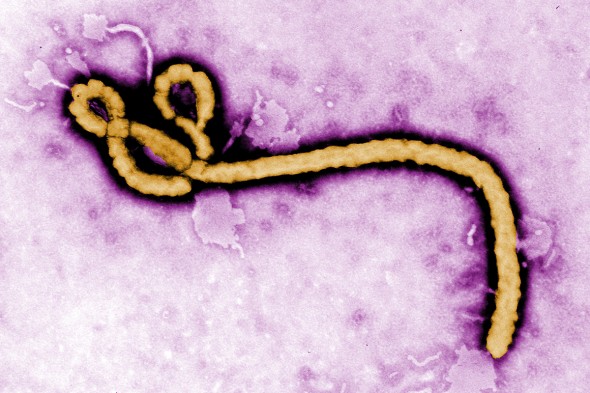UIC helps protect health care workers from Ebola, new diseases

UIC is one of six centers developing a strategy to prevent health care workers from infection when they treat patients with Ebola and other infectious diseases. Photo: Cynthia Goldsmith/Centers for Disease Control
UIC is one of six research centers in the U.S. working to develop a comprehensive strategy to protect health care workers who care for patients with Ebola and other infectious diseases.
The UIC Epicenter for Prevention of Healthcare Associated Infections is a new collaboration between infectious disease physicians in the College of Medicine and industrial hygienists in the School of Public Health.
Research funded by the Centers for Disease Control and Prevention will be conducted at UI Health, the Jesse Brown VA Medical Center and St. Anthony’s Hospital.
The largest Ebola epidemic in history last year killed more than 11,000 people in West Africa and spread to the U.S.
Public health officials are concerned about health care workers contracting Ebola or other emerging infectious diseases such as SARS and pandemic influenza, said Rachael Jones, associate professor of environmental and occupational and health sciences, one of four co-investigators at UIC.
“There are significant uncertainties about how emerging infectious diseases are transmitted, and how easy it is to become infected with these diseases, making it difficult to evaluate the risk to health care workers and other patients,” Jones said.
Officials want to know how much protection is afforded by personal protective equipment, work practices and other infection-control precautions caregivers use to reduce exposure to pathogens and risk of infection, she said.

“Up to 90,000 deaths a year are attributed to health care-associated infections,” says UIC researcher Susan Bleasdale.
More equipment may not protect health care workers if they can’t perform tasks safely in bulky gear, or if they contaminate themselves when taking it off, said Susan Bleasdale, assistant professor of medicine, infection control medical director and co-investigator.
UIC will receive $2.2 million during the three-year study. University of Iowa, University of Maryland at Baltimore, University of Utah, Emory University and Johns Hopkins University are other new prevention epicenters.
Spread of infectious diseases in health care settings adds billions of dollars to health care costs in the U.S. Infectious diseases like influenza, antibiotic-resistant bacteria and C. difficile can spread when infection control measures are insufficient or recommendations are not followed.
“Five to 10 percent of patients admitted to hospitals will develop a health care-associated infection, and up to 90,000 deaths a year are attributed to healthcare-associated infections,” Bleasdale said. “We need to decrease those numbers to protect our patients and employees.”
Understanding how health care workers can become contaminated “will help us find new ways to prevent the spread of infections in hospitals,” she said.
Other UIC co-investigators are Lisa Brosseau, professor of environmental and occupational health sciences, and Monica Sikka, associate medical director of infection control.
